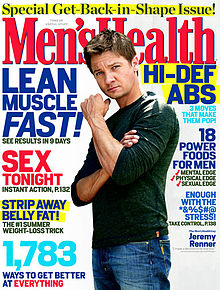- Medical journalism
-
For Wikipedia's own guideline to reliable medical sources, see Wikipedia:Reliable sources (medicine-related articles).
 Men's Health magazine, published by Rodale Press
Men's Health magazine, published by Rodale Press
Medical journalism is the dissemination of health-related information through mainstream media outlets. Medical issues are widely reported, and these reports influence doctors, the general public, and the government. The coverage is often criticized for being misleading, inaccurate, or speculative.[1] Several web sites and journals review medical journalism.
Contents
Accuracy
News coverage is often criticized for being misleading, inaccurate, or speculative, and this has been traced to several problems that include lack of knowledge by reporters, lack of time to prepare a proper report, and lack of space in the publication.[1] Most news articles fail to discuss important issues such as evidence quality, costs, and risks versus benefits.[2] However, medical journalism is not only what is being commercialized and covered by news and mass media. There is also another extensive, more academic branch of medical journalism which is based on evidence. Evidence-based research is more accurate and thus it is a much more reliable source than medical news disseminated by tabloids. Medical journalism in this regard is a professional field and is often disregarded. There are also some medical journalism institutions that provide assistance to medical researchers to enable them to perform more reliable studies. Adib Vira Medical Journalism Open Institute provides services for both medical researchers and journals in order to enhance the quality of studies and journals, as well as assist researchers in performing their studies ethically and according to global medical journalism standards. Although medical news articles often deliver public health messages effectively, they often convey wrong or misleading information about health care, partly when reporters do not know or cannot convey the results of clinical studies, and partly when they fail to supply reasonable context.[3] A 2009 study found small improvements in some areas of medical reporting in Australia, but the overall quality remained poor, particularly in commercial human-interest television programs.[4]
Conflict of interest
Medical journalists also face challenges due to potential conflicts of interest. The pharmaceutical industry has sponsored journalism contests that carry large prizes in cash or in overseas trips. The Association of Health Care Journalists (AHCJ) urges journalists to consider these contests carefully before entering, and most journalists avoid them. The Center for Excellence in Health Care Journalism, the supporting 501(c)(3) for AHCJ, does not accept industry funding. The National Association of Science Writers does not accept such funding. The changing nature of news media has caused more reporters to work freelance, outside of traditional news organizations such as major metropolitan newspapers, which may have created more ways to sidestep conflict-of-interest standards, and the rise of blogs has allowed nontraditional providers of news that lack these standards entirely.[5]
Reviews
Sources for evaluating health-care media coverage include the review websites Behind the Headlines, Health News Review, and Media Doctor (see External links), along with specialized academic journals such as the Journal of Health Communication. Reviews can also appear in the American Journal of Public Health, the Columbia Journalism Review, Ben Goldacre's "Bad Science" column in The Guardian, and others. Health News Review has published criteria for rating news stories.[6]
See also
References
- ^ a b Larsson A, Oxman AD, Carling C, Herrin J (2003). "Medical messages in the media—barriers and solutions to improving medical journalism". Health Expect 6 (4): 323–31. doi:10.1046/j.1369-7625.2003.00228.x. PMID 15040794.
- ^ Schwitzer G (2008). "How do US journalists cover treatments, tests, products, and procedures? an evaluation of 500 stories". PLoS Med 5 (5): e95. doi:10.1371/journal.pmed.0050095. PMC 2689661. PMID 18507496. http://medicine.plosjournals.org/perlserv/?request=get-document&doi=10.1371/journal.pmed.0050095. Lay summary – Guardian (2008-06-21).
- ^ Dentzer S (2009). "Communicating medical news—pitfalls of health care journalism". N Engl J Med 360 (1): 1–3. doi:10.1056/NEJMp0805753. PMID 19118299. http://content.nejm.org/cgi/content/full/360/1/1.
- ^ Wilson A, Bonevski B, Jones A, Henry D (2009). "Media reporting of health interventions: signs of improvement, but major problems persist". PLoS ONE 4 (3): e4831. doi:10.1371/journal.pone.0004831. PMC 2652829. PMID 19293924. http://www.plosone.org/article/info:doi/10.1371/journal.pone.0004831.
- ^ Greene J (2009). "Pharma's influence on the fourth estate: health care journalists' conflicts also scrutinized". Ann Emerg Med 53 (3): 18A–20A. doi:10.1016/j.annemergmed.2009.01.010. PMID 19244660.
- ^ "How we rate stories". Health News Review. 2008. http://healthnewsreview.org/how_we_rate.php. Retrieved 2009-03-26.[dead link]
External links
- Media Doctor (Australia)
- Behind the Headlines (UK)
- Health News Review (U.S.)
- How to Read Articles about Health and Healthcare by Alicia White
Journalism Profession Areas Genres Advocacy · Analytic · Broadcast · Churnalism · Citizen · Civic · Collaborative · Community · Database · Gonzo · Investigative · Literary · Muckraking · Narrative · "New Journalism" · Non-profit journalism · Online · Opinion · Peace · Photojournalism · Scientific · Visual · Watchdog
Social impact News media Roles List of journalism articles Categories:- Medical journalism
- Journalism stubs
Wikimedia Foundation. 2010.
